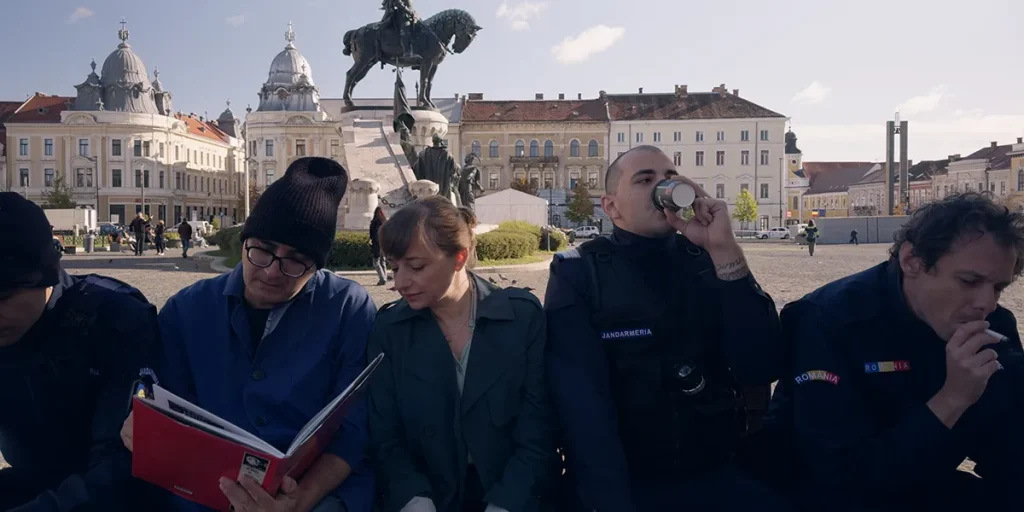A bailiff tries to relieve her guilty conscience in Radu Jude’s Kontinental ’25, another example of the director’s direct filmmaking style.
Writer & Director: Radu Jude
Genre: Comedy, Drama
Run Time: 109′
BFI London Film Festival Screening: October 17-18, 2025
U.S. Release Date: TBA
U.K. Release Date: TBA
It was only at last year’s LFF that the prolific Radu Jude brought us Eight Postcards from Utopia, his curated collection of Romanian adverts that revealed our relationship with consumer culture and capitalism. Months later, at the Berlinale, he premiered a new film in Kontinental ’25, which he shot on an iPhone with the same crew he used for his take on Dracula.
Unlike that film, which is said to be a sprawling, multi-chapter film taking on AI, Kontinental ’25 is a much smaller-scale project. Yet Jude’s thematic ambitions are still evident in this typically unvarnished, realist social drama that tackles morality in our modern world.
In the city of Cluj, Transylvania, we start with a homeless man named Ion (Gabriel Spahiu, who features in Jude’s Dracula). He strolls around looking for work or money from people, finding litter or scraps of food as he goes, before returning to the abandoned cellar where he dwells. This opening is a shrewd choice from Jude, who familiarises us with a man trying to get by before everything changes with a knock on the door. It comes from Orsolya (Eszter Tompa, The Duke of Burgundy), occupied by the gendarmes. She is here to evict Ion on behalf of a German firm, which is turning the property into a boutique hotel.
When Ion takes his own life as a result, the perspective shifts from him to Orsolya (Jude said he was directly inspired by Psycho). She becomes riddled with guilt, not helped by the press attacking the Hungarian-ethnic for forcing out a former athlete in Ion. So Orsolya lets her family go on holiday to Greece without her and tries to find a way to relieve her guilty conscience.
Kontinental ’25 is once again a thorough examination of post-socialist Romanian society, the main throughline in all of Jude’s films. Here, that manifests in points on economic expansion and the housing crisis worsened by outside European forces like the firm building the hotel that sets off this chain of events. “Real estate developers rule Romania. Bunch of crooks,” Orsolya says at one point. “And mobsters,” replies her husband. Themes of nationalism also creep in. Orsolya’s meeting with her mother leads to heads being butted over Hungary and its far-right leader Viktor Orbán. And when she meets a former student (Orsolya used to teach Roman Law) who is now a delivery cyclist in the gig economy, he notes the Romanian colours on his bag so he doesn’t get abused.
The setting is significant as well. In 1918, Romania claimed Transylvania from the Hungarians (who were part of the disintegrating Austro-Hungarian Empire). And in the present day, Cluj is home to both a booming IT industry and gentrification. Jude and his regular DP Marius Panduru show this off with a tour of modern Romania. Old ruins, historic buildings and monuments are contrasted with new apartment housing and gated private residences with naturalistic wide shots.
A big influence this time is Roberto Rossellini’s Europe ’51. That film saw Ingrid Bergman play an uncaring wife who becomes a humanitarian after her son’s death. There, she turns towards helping people in a search for redemption. In Kontinental ’25, Orsolya’s crisis leads to no real change in this system, just a need for reassurance. That can be seen in the way she tells the story of Ion’s death to everyone she meets, getting all of them – friends, colleagues, even Orthodox priests – to say it wasn’t her fault. Is it performative? Self-pitying? Ordinary neoliberalism?
Speaking in the film’s press notes, Jude said that he was inspired by Psycho because it “begins with a victim and then shifts focus to the perpetrator.” Again, Orsolya is not at fault for what happened, but she feels complicit enough to feel guilty, yet somehow not guilty enough to do anything more about it. All this wouldn’t be as effective without Eszter Tompa’s performance. Jude focuses on her character’s struggles, and Tompa anchors the film as the well-meaning Orsolya.
Kontinental ’25 is what you expect from Radu Jude at this point, not just in what his films say, but how it is being said. He once again shows the ills and inequalities of our modern world, but also the bizarreness of it, and how we try to cope. And it is all presented in Jude’s customarily direct and austere filmmaking with pinches of dark humour, whether Orsolya’s boss compares her to “that guy in Schindler’s List” or big plastic dinosaurs linger in a couple of scenes.
Of course, this style has its limits as Jude relies on his themes. And since they don’t always work, the film can be a dry and slow experience at times. It was the same with Do Not Expect Too Much From The World (though this is much shorter). Still, there is much to admire about Kontinental ’25 and much to interrogate underneath its surface.
Kontinental ‘25: Movie Plot & Recap
Synopsis:
In Cluj, Transylvania, bailiff Orsolya evicts a homeless man from a cellar so a firm can build a boutique hotel. When the man commits suicide, a guilt-ridden Orsolya has a crisis of conscience.
Pros:
- The prolific Radu Jude returns with insightful points about Romanian society, the housing crisis and morality in our bizarre modern world.
- The effective performance from Eszter Tompa anchors the film.
Cons:
- Radu Jude can be a polarising filmmaker, and the film can be a dry and slow experience at times.
Kontinental ‘25 was screened at the BFI London Film Festival on 17-18 October, 2025.

